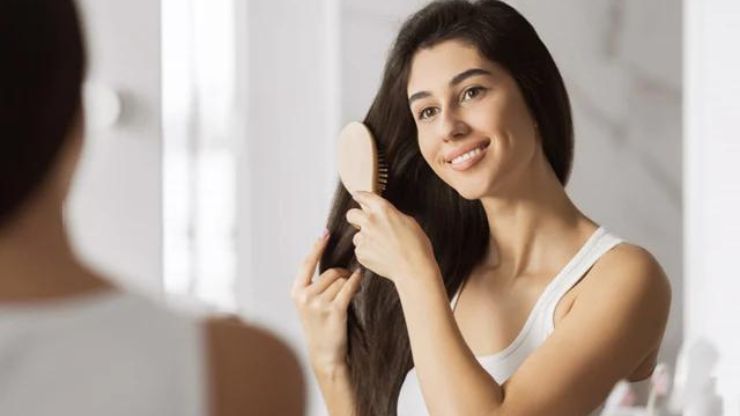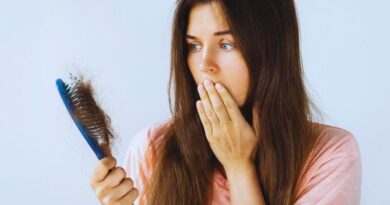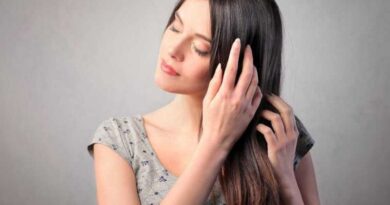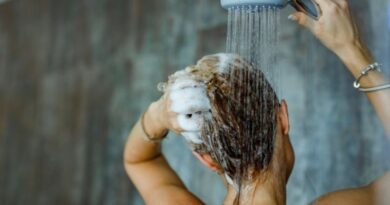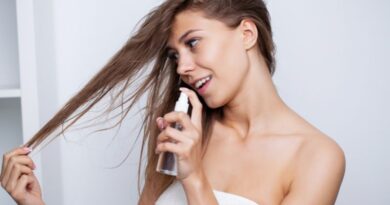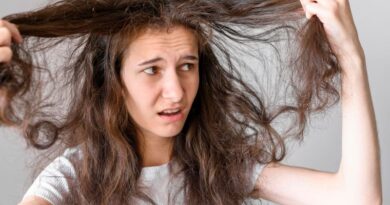Natural Haircare Tips for Strong and Healthy Locks – Natural haircare is not just a trend; it’s a commitment to healthier, stronger, and more beautiful locks. The desire for vibrant and well-nourished hair has led many to seek out natural alternatives to traditional haircare products and routines. In this guide, we’ll explore a holistic approach to achieving strong and healthy hair through natural methods. From proper cleansing and moisturizing techniques to protective styling, nutrition, and scalp care, we’ll cover essential tips that can transform your haircare routine.
By embracing these practices, you can reduce damage, prevent common hair problems, and enhance the natural beauty of your locks. Whether you have curly, straight, wavy, or coiled hair, the principles of natural haircare can benefit everyone. So, let’s delve into the world of natural haircare and discover how you can achieve the strong and healthy locks you’ve always desired.
Importance of natural haircare
Natural haircare is of paramount importance for several compelling reasons:
- Healthier Hair: Natural haircare methods prioritize the use of ingredients that are gentle on your hair and scalp. This minimizes the risk of damage and the stripping of natural oils. As a result, your hair can maintain its vitality and strength, leading to overall better hair health.
- Reduced Chemical Exposure: Many commercial haircare products contain chemicals, sulfates, and synthetic fragrances that can be harmful to both your hair and your overall well-being. Natural haircare minimizes exposure to these potentially harmful substances, promoting a healthier, more toxin-free lifestyle.
- Sustainable and Eco-Friendly: Natural haircare often aligns with environmentally friendly practices. Using organic and sustainable ingredients, as well as minimizing the use of single-use plastics and non-biodegradable packaging, contributes to a healthier planet.
- Versatility for All Hair Types: Natural haircare practices can be adapted to suit a wide range of hair types and textures. Whether you have straight, curly, wavy, or coiled hair, there are natural methods and products available to cater to your specific needs.
- Cost-Effective: Many natural haircare ingredients are readily available, affordable, and can be used for various hair treatments. This can save you money in the long run, as you may not need to purchase expensive hair products filled with chemicals.
- Preventing Hair Issues: Natural haircare often involves practices that help prevent common hair problems such as breakage, split ends, and excessive dryness. By maintaining the natural balance of your hair and scalp, you can proactively avoid these issues.
Also, Read – Importance of Regular Hair Washing for Hygiene
Natural Haircare Tips for Strong and Healthy Locks
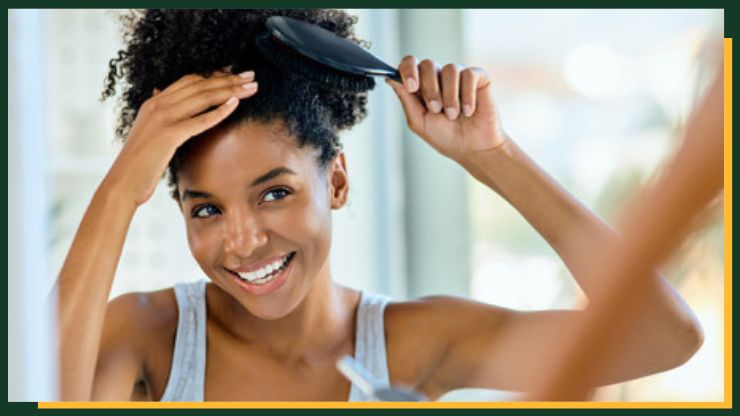
Proper Nutrition
Proper nutrition is vital for overall health. A well-balanced diet rich in fruits, vegetables, lean proteins, whole grains, and healthy fats provides essential vitamins and minerals. It supports energy levels, a strong immune system, and healthy body weight. Additionally, staying hydrated by drinking enough water is crucial. Limit processed foods, added sugars, and excess salt, as they can lead to health problems.
Portion control is essential for weight management. Consider individual dietary needs and any dietary restrictions. A balanced diet is the foundation of a healthy lifestyle, promoting physical and mental well-being.
Hydration
Hydration is essential for overall well-being. Water makes up a significant portion of our bodies and plays a vital role in various bodily functions. It helps regulate body temperature, aids digestion, transports nutrients, and flushes out waste and toxins. Proper hydration ensures clear thinking, supports healthy skin, and maintains organ function. Dehydration can lead to fatigue, headaches, and dizziness.
The daily water intake varies from person to person but generally falls around 8-10 cups (2-2.5 liters) per day. It’s crucial to adjust this based on individual factors such as activity level and climate. Staying adequately hydrated is a simple yet crucial aspect of maintaining good health.
Gentle Cleansing
Gentle cleansing is essential for maintaining healthy skin. Use a mild, pH-balanced cleanser suited to your skin type (e.g., oily, dry, sensitive). Harsh soaps and cleansers can strip the skin of its natural oils, leading to dryness and irritation. When washing your face, use lukewarm water, not hot, to avoid excess dryness.
Gently massage the cleanser into your skin in a circular motion, then rinse thoroughly. Avoid scrubbing vigorously, which can damage the skin’s protective barrier. Pat your skin dry with a clean, soft towel, rather than rubbing. Consistent, gentle cleansing helps remove dirt, makeup, and impurities while keeping your skin’s natural balance intact.
Conditioning
Conditioning is a vital step in a haircare routine. It helps maintain hair’s moisture balance and overall health. Use a suitable conditioner based on your hair type and needs, whether it’s for moisture, volume, or damage repair. Apply conditioner primarily to the ends and the mid-length of your hair, avoiding the scalp to prevent greasiness.
Leave it on for the recommended time, then rinse with cool water for added shine and to seal the hair cuticles. For deeper hydration, consider using a weekly deep conditioner or hair mask. Conditioning not only improves hair manageability but also minimizes frizz, breakage, and enhances the overall look and feel of your hair.
Also, Read – Tips for Maintaining Proper Hair Hygiene
Protective Hairstyles
Protective hairstyles are essential for minimizing hair damage and promoting healthy growth. They involve styles that tuck the ends of your hair away, reducing exposure to environmental stressors and daily manipulation. Common protective hairstyles include braids, twists, buns, and weaves. These styles reduce friction and prevent excessive pulling, which can lead to breakage and split ends.
Use a silk or satin hair accessory, like a bonnet or scarf, to protect your hair while you sleep. Remember not to make the styles too tight, as this can damage your hair and scalp. Protective hairstyles are a great way to give your hair a break and encourage its natural growth and strength.
Avoid Heat Styling
Avoiding heat styling is beneficial for maintaining healthy hair. Excessive use of flat irons, curling irons, and blow dryers can lead to heat damage, making hair dry and prone to breakage. To protect your locks, minimize heat styling as much as possible. Allow your hair to air-dry naturally or use a lower heat setting on your styling tools when necessary.
Always apply a heat protectant spray before heat styling to create a barrier between your hair and the heat. Embrace heat-free styling methods like braids, twists, or buns to achieve desired hairstyles without damaging heat exposure. Reducing heat styling can lead to stronger, more resilient, and naturally beautiful hair.
Trim Regularly
Regular hair trims are essential for maintaining healthy and strong locks. Trimming your hair every 6-8 weeks helps prevent split ends from traveling up the hair shaft, which can lead to breakage. It also promotes a neater appearance and helps maintain your hair’s shape and style. Even if you’re growing your hair out, getting rid of damaged ends is crucial for overall hair health.
Regular trims are especially important for those with longer hair, as the ends are older and more susceptible to damage. A hairstylist can assess the condition of your hair and recommend the appropriate trim, keeping your locks in their best condition.
Avoid Chemical Treatments
Avoiding chemical treatments is crucial for maintaining the health and integrity of your natural hair. Chemical processes like perms, relaxers, and hair dyes can weaken the hair structure, causing dryness, breakage, and long-term damage. These treatments often use harsh chemicals that alter the hair’s natural composition.
Instead, embrace your natural texture and color or opt for non-chemical alternatives like henna for dyeing or heat-free styling methods for texture changes. If you must use chemical treatments, consult a professional stylist who specializes in natural hair and follow proper aftercare to minimize potential damage. Prioritizing chemical-free options will help your hair remain strong and vibrant.
Protective Hair Accessories
Protective hair accessories are essential for safeguarding your hair from damage and promoting its health. Silk or satin scrunchies, bonnets, or headscarves help minimize friction, reducing the risk of breakage and preventing hair from drying out. These materials are gentle on the hair and help maintain moisture.
Wearing protective styles like braids or twists is also an effective way to shield your hair from daily wear and tear. Be sure to choose accessories that are free from rough seams or edges that can snag your hair. Incorporating protective hair accessories into your routine can contribute to stronger, healthier, and more manageable hair.
Natural Oils
Natural oils are a valuable component of a healthy haircare routine. They can nourish, strengthen, and add shine to your hair. Some popular natural oils for hair include:
- Coconut Oil: Known for its deep conditioning properties, it can reduce protein loss and strengthen hair.
- Olive Oil: Rich in antioxidants and moisturizing properties, it helps improve hair’s overall health.
- Argan Oil: Hydrates and adds shine, making it great for dry or frizzy hair.
- Jojoba Oil: Balances oil production and unclogs hair follicles, promoting healthier hair growth.
- Castor Oil: Can boost hair growth and is beneficial for those with thinning hair.
- Almond Oil: Nourishes and softens the hair, helping to reduce breakage.
Use these oils as a pre-wash treatment, leave-in conditioner, or to massage the scalp. However, it’s important to tailor your choice to your hair type and needs.
Hair Masks
Hair masks are deep-conditioning treatments that provide numerous benefits for your hair. They are formulated with nourishing ingredients to promote hydration, repair damage, and improve hair health. You can use store-bought hair masks or create your own DIY versions with natural ingredients. Hair masks can:
- Hydrate: Restore moisture to dry and damaged hair, reducing frizz and brittleness.
- Repair: Help repair split ends and strengthen hair, preventing breakage.
- Soften: Make hair smoother and more manageable, enhancing its texture and appearance.
- Revitalize: Bring life and vibrancy back to dull, lifeless hair.
- Protect: Some masks contain ingredients that shield hair from environmental damage.
Use a hair mask once a week or as needed, applying it to clean, damp hair, leaving it on for the recommended time, and rinsing thoroughly. Hair masks are an excellent addition to your hair care routine for maintaining strong and healthy locks.
Avoid Overwashing
Overwashing your hair can strip away its natural oils, leaving it dry and more prone to damage. How often you should wash your hair depends on your hair type, but daily washing is rarely necessary. Frequent washing can disrupt the scalp’s oil production, leading to greasier hair between washes. If you have dry or curly hair, consider washing every 2-3 days or even less frequently.
Use a gentle, sulfate-free shampoo, and always follow with a conditioner to maintain moisture balance. On non-wash days, you can use dry shampoo to refresh your hair. Avoid overwashing to keep your hair’s natural oils intact, leading to healthier, shinier, and more manageable locks.
Conclusion
In conclusion, natural haircare offers a holistic and healthier approach to maintaining strong and vibrant locks. By embracing gentle, chemical-free methods, you not only enhance the well-being of your hair but also promote a more sustainable and eco-friendly lifestyle.
Embracing your natural beauty and preventing common hair issues becomes attainable, all while fostering a sense of confidence and self-acceptance. Natural haircare is more than a routine; it’s a commitment to nourishing your hair and embracing a lifestyle that’s kinder to both you and the planet.
FAQs
The frequency of hair washing depends on your hair type and lifestyle. Generally, it’s recommended to wash your hair once or twice a week to avoid over-drying.
Yes, natural haircare can be adapted for all hair types, including straight, curly, wavy, or coiled hair. There are methods and products tailored to each hair type.
Look for ingredients like aloe vera, coconut oil, shea butter, and essential oils. These natural elements can provide moisture, nourishment, and strength to your hair.

